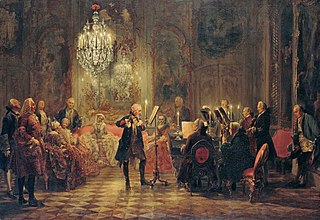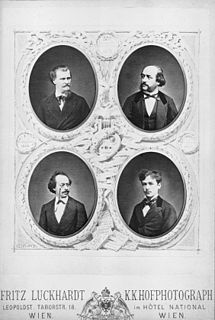In music, a quartet or quartette is an ensemble of four singers or instrumental performers; or a musical composition for four voices or instruments.

A string quartet is a musical ensemble consisting of four string players – two violin players, a viola player and a cellist – or a piece written to be performed by such a group. The string quartet is one of the most prominent chamber ensembles in classical music, with most major composers, from the mid 18th century onwards, writing string quartets.

Chamber music is a form of classical music that is composed for a small group of instruments—traditionally a group that could fit in a palace chamber or a large room. Most broadly, it includes any art music that is performed by a small number of performers, with one performer to a part. However, by convention, it usually does not include solo instrument performances.
A string orchestra is an orchestra consisting solely of a string section made up of the bowed strings used in Western Classical music. The instruments of such an orchestra are most often the following: the violin, which is divided into first and second violin players, the viola, the cello, and usually, but not always, the double bass.
The Takács Quartet is a string quartet, founded in Hungary, and now based in Boulder, Colorado, United States.

David Leo Diamond was an American composer of classical music.
The Corvinus String Quartet is a renowned Budapest based string quartet.
It was founded in 2003 when its members were students of the Liszt Ference Music Academy and members of the Danubia national youth symphony orchestra.
All members have shown great results in international competitions as soloists and are active as a string quartet.
Having studied under Hargitai & Perenyi, they succeeded in many concerts in Budapest and other major cities in Hungary.
In 2005 they were invited to the Young Prague Festival at the Czech Republic. In 2005 and 2006 they had performed in the Budapest Spring Festival and in 2007 the quartet was invited for a concert tour in Tokyo, Japan. The quartet's playing is dynamic and full of young spirit.
The violin octet is a family of stringed instruments developed in the 20th century primarily under the direction of the American luthier Carleen Hutchins. Each instrument is based directly on the traditional violin and shares its acoustical properties, with the goal of a richer and more homogeneous sound. Unlike the standard modern stringed instruments, the main resonance of the body of the violin octet instrument is at a pitch near the two middle open strings, giving the instruments a more balanced, clearer sound.
The Salomon Quartet was formed in 1982 as one of the first string quartets playing music of the classical period on authentic instruments and informed by historical scholarship. The quartet originally comprised Simon Standage, (violin), Micaela Comberti †, (violin), Trevor Jones †, (viola), and Jennifer Ward Clarke †, (cello). Violin II is now taken by Catherine Martin and viola by Adrian Romer.

Tibor Varga was a violinist, conductor and pedagogue of worldwide renown.

The Hagen Quartet was founded in 1981 by four siblings, Lukas, Angelika, Veronika and Clemens, in Salzburg, Austria.
The quartet members are teachers and mentors at the Salzburg Mozarteum and the Hochschule für Musik Basel. The ensemble made its Salzburg Festival debut in 1984. The complete recordings of the Mozart string quartets were released in 2006. In the 2012–2013 season, the Hagen Quartet performed the complete Beethoven cycle in New York, Tokyo, Paris, London, Salzburg and Vienna.
They performed, between December 2013 and August 2017, on the four famous Stradivarius instruments played previously by the Paganini Quartet, the Cleveland String Quartet, and the Tokyo String Quartet, respectively. Those instruments are now being played by the Quartetto di Cremona.

Cuarteto Latinoamericano is a Latin Grammy winning string quartet based in Mexico City. They have toured extensively in Europe, the Americas, Israel, China, Japan and New Zealand. The recipient of a Mexican Music Critics Association award in 1983 and "most adventurous programming" awards from CMA/ASCAP in 1997, 1999 and 2000, the group has introduced more than a hundred works written for them and has participated in over a hundred world premieres.

The Hellmesberger Quartet was a string quartet formed in Vienna in 1849. It was founded by Joseph Hellmesberger Sr. and was the first permanent named String Quartet.

The Pavel Haas Quartet is a Czech string quartet which was founded in 2002. Their first album with the second quartets of Haas and Janáček won the 2007 Gramophone Award for Chamber music. The Gramophone reviewer David Fanning described their playing as "streamlined but full-blooded". Their recording of the Dvořák String Quartets Op. 106 & 96 won the Gramophone Awards' most coveted "Recording of the Year" prize in 2011.
The St. Lawrence String Quartet is a Canadian string quartet, and one of Canada's premier chamber ensembles.
Veronika Judita Krausas is a Canadian composer who lives and works in the United States.

BBC Radio 3 New Generation Artists scheme was launched in 1999 by Adam Gatehouse as part of the BBC's commitment to young musical talent. Each autumn six or seven young artists at the beginning of careers on the national and international music scenes join the scheme for a two-year period. Since 2006 a jazz artist has also been invited every other year. The artists are given performance opportunities, including Radio 3 studio recordings, appearances and recordings with the BBC Orchestras and appearances at several music festivals, including the Cheltenham International Festival and the BBC Proms. They also regularly appear at the Edinburgh Festival, Aldeburgh Festival, East Neuk Festival, Gregynog Festival, Lufthansa Festival of Baroque Music and the York Early Music Festival. Artists also appear at London's Wigmore Hall in the Radio 3 Lunchtime Concert series, as well as at The Sage Gateshead and other UK concert venues UK.
The Fred Sherry String Quartet is an American classical string quartet.
The New Orford String Quartet is a Canadian string quartet formed in July 2009. It is one of Canada's premiere chamber ensembles. The name honours the Orford Arts Centre in the province of Quebec, where the ensemble gave its first public concert, and the original Orford String Quartet that was formed in June 1965 and active until July 1991.

String Quartet No. 2, Op. 22, No. 2, in G major, is a chamber-music work by the Romanian composer George Enescu, composed mainly between 1950 and 1951, though it has a lengthy pre-history and received a number of revisions in 1952 and possibly early 1953. The score is dedicated to the American pianist, composer, and arts patron, Elizabeth Sprague Coolidge. A performance of it lasts about 25 minutes.










